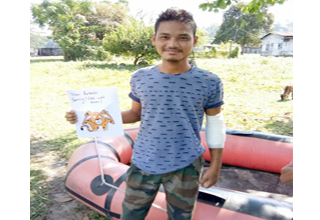[ Chayanika Barua & Violina Gogoi ]
“We fought for 20-30 seconds, rolling on the ground,” recalls 25-year-old Rakesh Nabum, who was attacked by a leopard on 25 October, 2017.
Rakesh, who joined the Pakke Tiger Reserve in 2004, is a daily wage patrolling staffer and part of the temporary Special Tiger Protection Force. On a daily basis, living in these forests is not easy. Sometimes even drinking water is not easy to come by.
On the day of the attack, the stream from which they usually collect fresh water was dirty as it had rained. Rakesh and his two fellow forest watchers and friends, Nana Miji and Tape Khunjuju, who work at the Tippi Ghat anti-poaching camp, had to come down to the Kameng river at around six in the evening to collect drinking water right after patrolling.
And that is when the scene of the attack unfolded. They were done drawing water from the river, and Nana and Tape were 10-15 metres away. Rakesh had to answer nature’s call, so he went to one side – and realized that he was being attacked from behind. He didn’t know by what, so at first he held the animal with force and threw him off; but the animal came furiously and attacked him again.
Facing the leopard suddenly made Rakesh nervous, but they both rolled on the ground, fighting for 20-30 seconds. The leopard, however, was not in a mood to let go of Rakesh’s arm. A hapless Rakesh shouted for help in the complete darkness. With his cell phone’s inbuilt light he could see the leopard holding him tightly by his left shoulder. His fellow watchers tried their level best to help him by trying to scare away the leopard by banging utensils and the big water gallons they were carrying.
The leopard finally let go of Rakesh, and Nana and Tape brought Rakesh back to camp while also making sounds to keep the leopard away. The staff immediately phoned Kime Rambia, the range forest officer of the Tippi Wildlife Range, as Rakesh’s left hand was bleeding heavily and his muscles seemed torn.
But they noticed that the leopard had only left the scene temporarily. It was back, waiting just near the camp. Tape blank-fired in the air, but the leopard was still waiting. They then informed their colleagues at another anti-poaching camp of this emergency and asked for their help. Finally, after an hour or so, with the help of everyone, Rakesh was brought back from across the Kameng river and out of Pakke.
Thankfully, on the other side the department vehicles were ready to rush him to the hospital. He was taken to the Bhalukpong government hospital, where they dressed his wound, after which he was immediately referred to Mission Hospital at Tezpur. A common friend and colleague known to the Pakke team took personal interest in ensuring the best care for Rakesh.
His dressing was done that night, and by morning he was operated on. He received 26 stitches on the upper half of his left arm. He had to stay at the hospital for another four days to recover fully, before being discharged.
Tackling this emergency was not easy either. Rakesh lives with his wife and their three-year-old daughter Yakum Nabum. His wife Dema was informed about the attack by her neighbour. The inordinate delay in fund release meant that Rakesh, along with other forest watchers, were not paid their salaries for four months prior to the incident. Rushing him to the hospital by ambulance, being admitted in the hospital and the operation cost approximately Rs 35,000, and the small amount of Rs 1 lakh that is sanctioned for emergency medical care for 200 anti-poaching staff was not released yet. Neither Rakesh nor other daily wage staffer is provided medical insurance that would enable them to deal with such life-threatening occupational hazard while on the field. Their care falls squarely on the shoulders of on-ground field officers, like on the divisional forest officer and the range forest officers and their teams who deal with such emergencies.
As with Rakesh, often money is advanced at a personal level and then reimbursed later. They try and find common colleagues and friends who can provide personalized care at hospitals, and the team tries to make every effort for the protection of their kith and kin. Finally, on returning home, Rakesh had to take a month off from his work.
The day after the incident, the leopard was sighted near the camp, and camera traps were immediately fitted to keep track of the animal. The leopard is still being seen by forest watchers, including Rakesh, who says that he has seen the leopard three times after the attack.
They usually sight the leopard just outside the camp,where he is seen staring at the camp. The leopard is a young full-grown male that they have been seeing since 2016.
“Earlier I used to roam around alone, carrying just khukris or knives, but now, after this incident, there’s a fear in my mind. And it’s not just me; the fear is there in the minds of my friends too. Hence now nobody goes alone,” says Rakesh.
Personal safety issues while on duty need attention because of a limited number of rifles present in Pakkebecause of the elaborate and long-drawn permissionrequired from the Home department.
Now, after four months of the incident, though his injury has dried up fully, other challenges exist. Rakesh has been working in Pakke since 2004, and gave an interview for the post of a permanent forest guard. He and other forest watchers are very hopeful about getting a fair chance at permanent positions in the Special Tiger Protection Force of Pakke. Thirty percent will be recruited from the local community from which they hail.
As we write this article with the financial year coming to an end in March, hopefully the next year brings along timely payment of their salaries and timely fund release. Rakesh is on the road to recovery, but he sometimes feels as if his stitched arm is hollow with no muscles inside. If the rest of us step up, muscle up and stand up for our forest protectors such as Rakesh and others, they will all have more muscle to protect Pakke. (Chayanika Barua and Violina Gogoi are Masters students pursuing Communication for Development, from Tezpur University, and doing their internship at Pakke Tiger Reserve)


